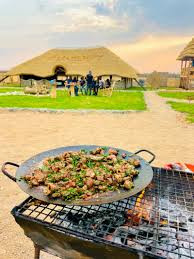
OVER a three-day period from July 30 to August 1, against the backdrop of the Southern Africa Development Community (Sadc) Summit, the first regional conference on agroecology came to life.
Hosted at the spacious Celebration Centre, the conference was held under the theme Recovering from El Niño-induced Drought through Agroecological Tailoring and Resilience Building.
Thanks to the Ministry of Lands, Agriculture, Fisheries and Rural Development, United Kingdom Aid, Voluntary Service Overseas Zimbabwe, and other organisations, including community-based ones, the event was a success.
Being held during Sadc Industrialisation Week, the conference brought together panellists and participants from across the region, including Tanzania, Kenya, and Botswana, to discuss the importance of agroecology in countering and building resilience against climate change. This exemplified public-private partnerships in action.
Agroecology is a science that combines agricultural principles with ecological considerations in farming and forestry systems.
For example, simple actions like combining bee-keeping and forestry, landfill water harvesting, and minimum tillage systems qualify as agroecological practices.
In short, agroecology is a low-cost approach that interweaves preserving the natural ecological balance with harnessing its agricultural production potential for food security, nutrition, and income purposes.
Local farmer Elizabeth Mpofu from the Zimbabwe Smallholder Organic Farmers Forum opened the ears of the participants with the line, "Chakatanga ndicho chakachenjedza".
- Zim farmers embrace agroecology
- Farmers urged to venture into agroecology
- Cultivating agroecology in Global South
- Sadc summit saves Vic Falls council boss from demo
Keep Reading
This implies a defiant call not to be brutalised by climate change again, urging rural and smallholder farmers to learn from the El Niño spell and reposition their enterprises towards better livelihoods.
Linda Gabriel, a modern rural farmer, permaculturalist, and poet, emphasized the need for more voices and information to be shared with climate-vulnerable communities to better understand agroecology.
Gabriel commended the Ministry of Lands, Agriculture, Fisheries and Rural Development for crafting an agroecology policy but called for grassroots inclusion and action plans that align with the National Development Strategies 1 and 2.
She highlighted the importance of shifting mind-sets towards environmentalism, focusing on households utilising locally-sourced resources, which are abundant. This is what Rural Action’s Tom Redfern emphasizes as the ‘asset-based approach’. The plenary discussions were both a cry for help and an exchange of ideas.
One key issue is how long-forgotten grains could be better placed in the agroecology matrix.
Another concern is the recognition of community-based or traditional seed systems and how they compare to certified seeds, considering seed costs and indigenous knowledge. There is a need to mainstream community seed systems while protecting seed quality and preventing diseases from non-certified seeds. The proposed Agroecology Policy could harmonise this conflict and create more localised seed options for smallholder farming communities.
Dr. J.O. Abbot’s presentation was particularly impactful, highlighting the importance of collaboration, equitable inclusion, gender sensitivity, and restoring dignity for El Niño-affected communities.
The El Niño effects strip smallholder communities and rural farmers of their dignity. She said transitioning towards clean energy, for example, would restore the dignity of women and girls affected by gathering firewood, handling kitchen smoke, and performing rough duties that impact their chances of having ‘soft hands’.
This human-centred approach drives agroecological innovation with both human and environmental sensitivity in mind.
The thought of transitioning to cleaner energy at household level is part of the narrative to have more ecologically friendly systems that power households against both a shifting climate and rising costs of living.
Day two of the conference, dubbed ‘The Market Day’, featured exhibitions and displays from local organisations and businesses showcasing nature-based products such as honey, peanut butter, small grain powder, and baobab-based products. The traction in locally produced nature-based products raises concerns about sustainability.
As we adapt, are we not equally exerting excess pressure on the natural environment? The agroecology paradigm aims to innovate in nature without continuing the harm posed by industrial actions. The Food Aid Agroecology is a gateway to community-owned agrotourism.
Packaging our diverse local palate in its original and native taste can attract more interest in tourism compared to foreign delicacies. The KwaTerry phenomenon is a pillar in the local systems revolution, pointing towards economic opportunities from locally influenced systems that appeal to a global audience. There is immense potential for rural entrepreneurship and circular economics in this frontier for youth and other disadvantaged groups. Agroecology and carbon – nature-based carbon sinks can be built by restoring ecological balance through this practice, tying into the developing carbon trading business opportunities and achieving our country’s Nationally Determined Contributions.
"Chakatanga ndicho chakachenjedza" – Agroecological practices have the potential to transform the reality of smallholder farmers affected by climate change and shape a post-El Niño future.
- Mafa is an agricultural economist and GLFx Chapter lead and co-founder of RIMA Africa. These weekly New Perspectives articles, published in the Zimbabwe Independent, are coordinated by Lovemore Kadenge, an independent consultant, managing consultant of Zawale Consultants (Pvt) Ltd, past president of the Zimbabwe Economics Society and past president of the Chartered Governance & Accountancy Institute in Zimbabwe (CGI Zimbabwe). — kadenge.zes@gmail.com or mobile: +263 772 382 852.










